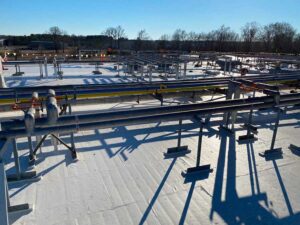
Flat roofing systems are a popular choice for commercial buildings in Corinth. They offer several advantages over traditional pitched roofs, making them a preferred option for many business owners. Understanding the key features of flat roofs and the materials used in their construction is essential for making an informed decision about whether this roofing system is right for your commercial building. In this article, we will discuss the benefits of flat roofing, the common challenges associated with it, tips for choosing the right contractor, and the installation process.
Understanding Flat Roofing Systems
Flat roofing systems are horizontal or nearly horizontal roofs that have a slight slope to allow for water drainage. Unlike pitched roofs, they have a minimal pitch and are mostly used for commercial buildings. The key features of flat roofs make them suitable for various applications, ranging from retail stores and offices to warehouses and industrial facilities.
Flat roofs have been a popular choice for commercial buildings due to their modern aesthetic appeal and practicality. They provide a sleek and contemporary look to the structure, enhancing its overall design. Additionally, the flat surface allows for easy installation of solar panels, contributing to energy efficiency and sustainability.
Key Features of Flat Roofs
One of the main features of flat roofs is their versatility. They provide usable space on top of the building, which can be utilized for various purposes such as rooftop gardens, outdoor seating areas, or equipment installations. Flat roofs also offer easy accessibility, making maintenance and repairs more convenient compared to pitched roofs.
Moreover, the design of flat roofs can incorporate skylights or roof windows, allowing natural light to illuminate the interior spaces. This not only reduces the need for artificial lighting during the day but also creates a bright and airy environment for occupants, promoting productivity and well-being.
Materials Used in Flat Roofing
Several materials are commonly used in flat roofing, including built-up roofing (BUR), modified bitumen, and single-ply membranes such as EPDM (ethylene propylene diene monomer), TPO (thermoplastic olefin), and PVC (polyvinyl chloride). Each material has its own advantages and suitability depending on factors such as climate, budget, and intended use of the building.
EPDM, known for its durability and weather resistance, is often preferred for its low maintenance requirements and long lifespan. On the other hand, TPO membranes offer excellent heat-reflective properties, reducing cooling costs during hot summers. PVC roofing membranes are highly resistant to chemicals and grease, making them ideal for restaurants and industrial facilities where exposure to such elements is common.
Benefits of Flat Roofing for Commercial Buildings
When it comes to commercial buildings, flat roofing offers several benefits that contribute to its popularity among business owners. Let’s explore some of these advantages:
Space Utilization and Accessibility
Flat roofs provide additional usable space on top of the building, which can be utilized for various purposes. This extra space can be turned into a rooftop garden, a recreational area for employees, or even a solar panel installation to generate renewable energy. Furthermore, the easy accessibility of flat roofs makes it easier to conduct routine maintenance and inspections, reducing the overall costs associated with roof upkeep.
Cost-Effectiveness and Energy Efficiency
Flat roofing systems are often more cost-effective than pitched roofs due to their simplified design and construction. The materials used in flat roofs are typically less expensive and easier to install. Additionally, flat roofs provide an opportunity for improved energy efficiency. With proper insulation and reflective coatings, they can contribute to reduced energy consumption and lower heating and cooling costs for the building.
Common Challenges with Flat Roofing
While flat roofing offers numerous benefits, it is not without its challenges. Being aware of these potential issues can help you address them effectively to ensure the longevity and functionality of your roof.
Drainage Issues and Solutions
One of the primary challenges with flat roofs is proper water drainage. If not designed and maintained correctly, flat roofs can experience water pooling, which can lead to leaks and structural damage. To mitigate these issues, it is essential to incorporate proper slope, install effective drainage systems, and conduct regular inspections to identify and address any drainage problems promptly.
Maintenance and Repair Needs
Flat roofing systems require regular maintenance to minimize the risk of leaks and other issues. Inspections should be carried out at least twice a year, and any necessary repairs should be addressed promptly. It is important to have a maintenance plan in place and work with a professional roofing contractor who specializes in flat roofs to ensure their longevity and integrity.
Choosing the Right Flat Roofing Contractor in Corinth
Selecting a reliable and experienced flat roofing contractor is crucial to the success of your commercial roofing project. Here are some essential qualities to look for when choosing a contractor:
Essential Qualities to Look For
1. Proven Experience: Look for a contractor with a track record of successfully completing flat roofing projects in Corinth.2. Licensing and Insurance: Ensure that the contractor holds the necessary licenses and has adequate insurance coverage to protect both parties.3. Reputation: Read reviews and seek recommendations from other commercial building owners who have worked with the contractor.4. Quality Materials: Ensure that the contractor utilizes high-quality materials from reputable manufacturers.5. Warranty: Inquire about the warranty provided for the roofing materials and installation workmanship.
Questions to Ask Your Potential Contractor
1. How long have you been installing flat roofing systems in Corinth?2. Can you provide references from previous clients?3. What type of flat roofing systems do you specialize in?4. How do you handle drainage design and installation?5. What is your approach to roof maintenance and repairs?
The Installation Process of Flat Roofs
The successful installation of a flat roofing system requires careful planning, attention to detail, and skilled craftsmanship. Here are some essential considerations and steps involved in the installation process:
Pre-Installation Considerations
Prior to installation, the contractor will evaluate the building’s structural requirements, assess the existing roof condition, and determine the appropriate materials and design for the flat roof. Proper slope, insulation, and drainage systems will be considered to ensure optimal performance.
Steps in the Installation Process
- Prepare the roof: The existing roof surface will be cleaned, repaired, and made ready for the installation.
- Install insulation: Insulation is crucial for energy efficiency and weather protection. It will be installed according to the chosen materials and design.
- Apply the roofing membrane: The selected roofing membrane, such as EPDM or modified bitumen, will be installed in accordance with manufacturer guidelines.
- Seal and finish: Flashings, seams, and any penetrations will be carefully sealed to ensure watertightness. The roof surface may be coated with reflective or protective finishes as necessary.
- Final inspection: The completed roof will undergo a thorough inspection to ensure it meets the required quality standards and specifications.
By following these steps and working with an experienced flat roofing contractor, you can expect a properly installed, functional, and durable flat roof for your commercial building in Corinth.
In conclusion, Corinth commercial flat roofing offers numerous advantages for business owners looking to enhance their commercial buildings. The versatility, space utilization, cost-effectiveness, and energy efficiency offered by flat roofs make them an attractive option. However, it is important to be aware of potential challenges and choose the right contractor to ensure proper installation and maintenance. With careful consideration and professional assistance, flat roofing can provide long-lasting protection and functionality for commercial buildings in Corinth.
Ready to give your commercial property in Corinth the superior protection it deserves? Look no further than Commercial Roofing Rana, your Platinum-level Duro-Last installer. With our extensive experience serving a diverse range of commercial buildings across the Mid-South, we understand the importance of a reliable roof. Don’t let water damage threaten your business—our precision-manufactured Duro-Last roofing systems are designed for perfect fit and unparalleled protection. Trust in our licensed professionals to fortify your building against the elements. Schedule Now and ensure your commercial building is equipped with the best defense against water damage.
